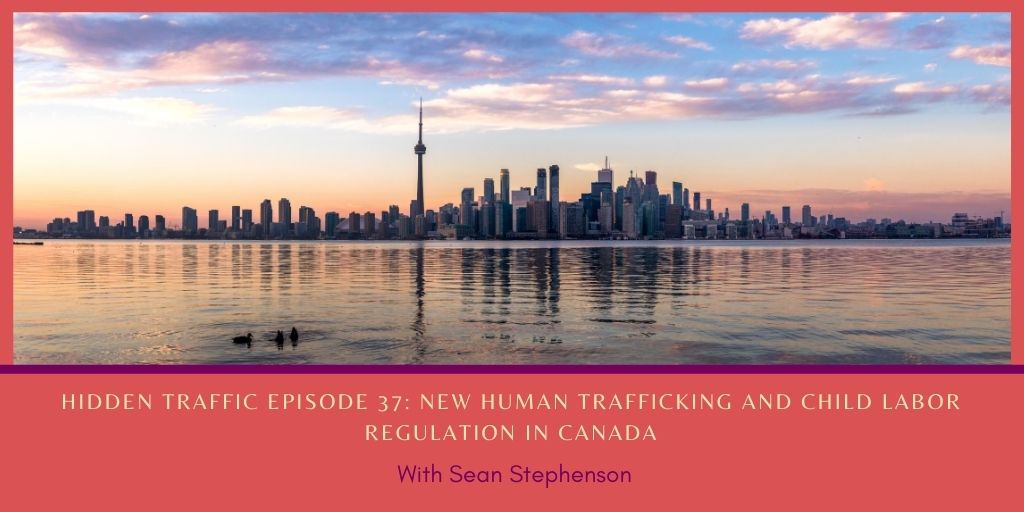
The global landscape of human trafficking and forced labor is evolving, and no country is immune. In this episode of Hidden Traffic, Gwen Hassan sits down with Sean Stephenson, an accomplished attorney based in Toronto. Sean works for the multinational law firm Dentons, and has extensive experience in trade and investment. The growing concern for supply chain integrity forms a significant part of his work, with particular emphasis on human trafficking, forced labor, and child labor. Together, he and Gwen delve into the new Canadian law aimed at preventing human trafficking, forced labor, and child labor within supply chains. Their conversation also provides insights into the practices of various multinational companies and explores the need for coherence in the anti-slavery reporting and measures across different jurisdictions.
The new Canadian legislation is known as the Modern Slavery Act, but is officially titled “Fighting Against Forced Labor and Child Labor in Supply Chains Act.” This law is set to come into effect on January 1, 2024. Sean underscores the legislation’s scope, noting that it will apply to a wide range of entities and industries that produce, sell, or distribute goods in or import goods into Canada. Sean clarifies, “The legislation is roughly based on another piece of legislation we have in Canada that was adopted a few years ago called the Extractive Sector Transparency Act, that’s focused specifically on the extractive sector, …But it’s much broader in nature. It’s not specific to the extractive sector. It applies to essentially any business formation.”
Despite the legislation’s primarily reporting nature, Sean distinguishes it from an actual diligence standard. He emphasizes the need for convergence in anti-slavery laws globally, which calls for a balance between compliance and alignment in disclosure across jurisdictions. However, he points out some unique features of the Canadian Act, such as its focus on child labor and specific liabilities for companies and directors for false and misleading statements.
Both Gwen and Sean believe in the Act’s potential to drive meaningful change in business practices related to human trafficking, forced labor, and child labor.
Sean sheds light on the operations and mandate of the Canadian Ombudsperson for Responsible Enterprise (CORE). CORE is an arm of the Canadian federal government, focusing on promoting the implementation of the UN and the OECD guidelines on multinational enterprises. The organization targets three specific areas: garment business, mining, and oil and gas. “Anyone can submit complaints to the CORE about business activities of Canadian businesses, either inside Canada or abroad”, Sean explains. He distinguishes CORE’s investigative powers, which are funded by the Canadian government, from those of a non-governmental organization. Gwen likens its investigative powers to those of a regulatory authority.
Sean points out that CORE cannot force document production but can accept and facilitate discussions around complaints. While CORE can’t directly impose penalties, they can recommend fines and referrals to law enforcement. Gwen highlights the potential reputational damage these investigations can pose for companies, and they both agree on the importance of proactive measures in mitigating these risks.
For companies seeking to comply with the CORE and other modern slavery regulations, Sean suggests starting with a thorough risk assessment, creating comprehensive supplier codes of conduct, and gradually building out compliance measures. He and Gwen emphasize the importance of proactive, transparent efforts in supply chain management, including the wider benefits beyond compliance, such as evaluating the overall health of suppliers. While enforcement in Canada has been less, businesses should still stay vigilant about international guidance to avoid potential issues.
Resources
Sean Stephenson on LinkedIn | Twitter
Canada’s Forced Labour and Child Labour Reporting Legislation: What You Need to Know





